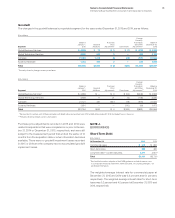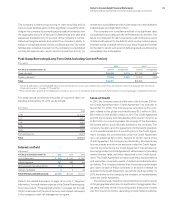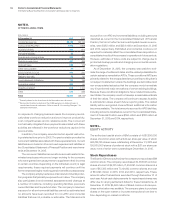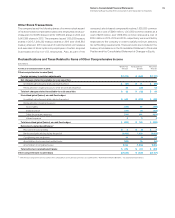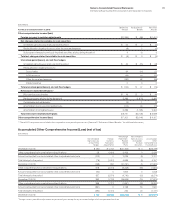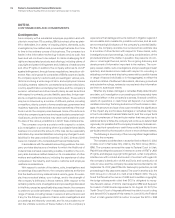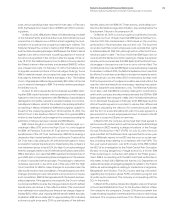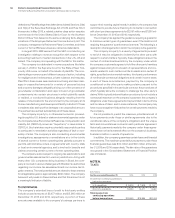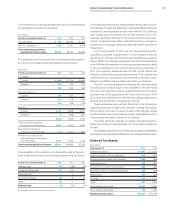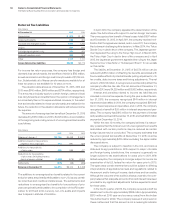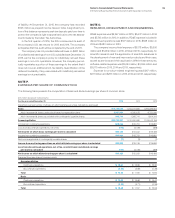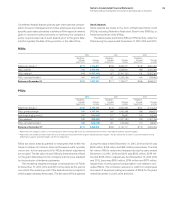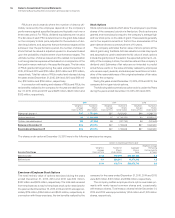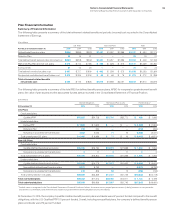IBM 2015 Annual Report Download - page 121
Download and view the complete annual report
Please find page 121 of the 2015 IBM annual report below. You can navigate through the pages in the report by either clicking on the pages listed below, or by using the keyword search tool below to find specific information within the annual report.Notes to Consolidated Financial Statements
International Business Machines Corporation and Subsidiary Companies
119
case, and proceedings have resumed in that case. In February
2016, the Federal Court ruled in favor of IBM on all of SCO’s remain-
ing claims.
On May13, 2010, IBM and the State of Indiana (acting on behalf
of the Indiana Family and Social Services Administration) sued
one another in a dispute over a 2006 contract regarding the mod-
ernization of social service program processing in Indiana. The
State terminated the contract, claiming that IBM was in breach,
and the State is seeking damages. IBM believes the State’s claims
against it are without merit and is seeking payment of termina-
tion amounts specified in the contract. After six weeks of trial, on
July18, 2012, the Indiana Superior Court in Marion County rejected
the State’s claims in their entirety and awarded IBM $52million
plus interest and costs. On February13, 2014, the Indiana Court
of Appeals reversed portions of the trial judge’s findings, found
IBM in material breach, and ordered the case remanded to the
trial judge to determine the State’s damages, if any. The Indiana
Court of Appeals also affirmed approximately $50million of the trial
court’s award of damages to IBM. This matter remains pending in
the Indiana courts.
On April16, 2014, Iusacell SA de C.V. (Iusacell) sued IBM, claim-
ing that IBM made fraudulent misrepresentations that induced
Iusacell to enter into an agreement with IBM Mexico. Iusacell claims
damages for lost profits. Iusacell’s complaint relates to a contrac-
tual dispute in Mexico, which is the subject of a pending arbitration
proceeding in Mexico initiated by IBM Mexico against Iusacell for
breach of the underlying agreement. On November14, 2014, the
District Court in the Southern District of New York granted IBM’s
motion to stay Iusacell’s action against the company pending the
arbitration in Mexico between Iusacell and IBM Mexico.
IBM United Kingdom Limited (IBM UK) initiated legal pro-
ceedings in May 2010 before the High Court in London against
the IBM UK Pensions Trust (the UK Trust) and two representative
beneficiaries of the UK Trust membership. IBM UK is seeking a
declaration that it acted lawfully both in notifying the Trustee of the
UK Trust that it was closing its UK defined benefit plans to future
accruals for most participants and in implementing the company’s
new retirement policy. In April 2014, the High Court acknowledged
that the changes made to its UK defined benefit plans were within
IBM’s discretion, but ruled that IBM breached its implied duty of
good faith both in implementing these changes and in the manner
in which it consulted with employees. Proceedings to determine
remedies were held in July 2014, and in February 2015 the High
Court held that for IBM to make changes to accruals under the
plan would require a new consultation of the participants, but other
changes (including to early retirement policy) would not require
such consultation. IBM UK has appealed both the breach and rem-
edies judgments. If the appeal is unsuccessful, the Court’s rulings
would require IBM to reverse the changes made to the UK defined
benefit plans retroactive to their effective dates. This could result
in an estimated non-operating one-time pre-tax charge of approx-
imately $250million, plus ongoing defined benefit related accruals.
In addition, IBM UK is a defendant in approximately 290 individual
actions brought since early 2010 by participants of the defined
benefits plans who left IBM UK. These actions, which allege con-
structive dismissal and age discrimination, are pending before the
Employment Tribunal in Southampton UK.
On March24, 2014, in a suit brought by local Works Councils,
the Supreme Court of Spain held that IBM Spain’s Defined Con-
tribution (DC) Plan implemented in 1993 based on the voluntary
participation of its employees was null and void. The Supreme
Court also held that current employees could reinstate their rights
to a Defined Benefit (DB) Plan, although with an offset for DC con-
tributions paid to date. The Court held that IBM Spain did not
consult with the Works Councils in seeking to change the pension
scheme, and recommended that IBM Spain and the Works Coun-
cils engage in discussions over how to carry out the offset. The
Constitutional Court denied IBM Spain’s requested leave to appeal
the decision. In March 2015, the National Audience Court ruled that
the Works Council was not entitled to dictate the means by which
IBM should carry out the offset of DC contributions, but also ruled
that the Supreme Court’s judgment could be executed without the
need for individual lawsuits by employees, rejecting the position
that the judgment was declaratory only. The National Audience
Court also ruled that IBM should stop making DC contributions,
and that the company should promptly reinstate the DB Plan. IBM
Spain appealed that ruling and in May 2015, the National Audience
Court dismissed the appeal. In February 2016, IBM Spain and the
Works Councils agreed on a process to resolve their differences
relating to calculating the offset for DC contributions paid to date
and the form of a new alternative DC plan. They also agreed to a
pay reduction for current employees who elect to remain in the DB
plan and to close the DB plan to new hires.
In March 2011, the company announced that it had agreed to
settle a civil enforcement action with the Securities and Exchange
Commission (SEC) relating to alleged violations of the Foreign
Corrupt Practices Act of 1977 (FCPA). On July25, 2013, the court
approved that 2011 settlement and required that for a two-year
period IBM make reports to the SEC and the court on certain mat-
ters, including those relating to compliance with the FCPA. The
two-year period expired in July 2015. In early 2012, IBM notified
the SEC of an investigation by the Polish Central Anti-Corruption
Bureau involving allegations of illegal activity by a former IBM
Poland employee in connection with sales to the Polish govern-
ment. IBM is cooperating with the SEC and Polish authorities in
this matter. In April 2013, IBM learned that the U.S. Department of
Justice (DOJ) is also investigating allegations related to the Poland
matter, as well as allegations relating to transactions in Argentina,
Bangladesh and Ukraine. The DOJ is also seeking information
regarding the company’s global FCPA compliance program and
its public sector business. The company is cooperating with the
DOJ in this matter.
In March 2015, putative class action litigation was commenced
in the United States District Court for the Southern District of New
York related to the company’s October 2014 announcement that
it was divesting its global commercial semiconductor technology
business. The company and three of its officers are named as




